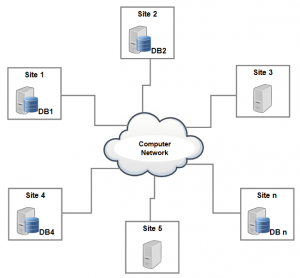 A distributed database consists of a network of many interconnected physical databases that spread across various geographical locations. The separate databases are periodically synchronized for ensuring all have consistent data.
A distributed database consists of a network of many interconnected physical databases that spread across various geographical locations. The separate databases are periodically synchronized for ensuring all have consistent data.
What Are The Benefits Of A Distributed Database System?
- The database remains scalable as administrators can add a node in the network at the concerned location to increase the database without interrupting its functionalities.
- The retrieval of information becomes efficient as the data remains stored locally.
- The system offers a significant amount of reliability as it does not stop functioning in case of a node failure. The functions of the failed node get distributed, amongst others.
- Put, a distributed database consists of many small databases at many locations. It is manageable to handle small databases compared to larger ones. Thus, they perform better.
- Failure of a single node does not impact data availability. The flow of information can be obtained from other nodes that are a part of the network.
Distributed Database System In DBMS
A database management system, often referred to as DBMS, is information management software that assists in managing, retrieving, manipulating, and defining data. Besides setting the rules for manipulating and validating the data, the software can change the record and file structure, field names, as well as the data format.
When combined with a distributed database, it acts as a DDMBS- Distributed Database Management System. The centralized data allocation in distributed database ensures that any changes made in one of the connected databases are updated universally by synchronizing data periodically.
Besides other applications, DDBMS is widely used by data warehousing firms that allow numerous database clients to access and process a large volume of data at the same time.
The system preferred due to its ability to maintain data integrity and confidentiality while managing data in networks.
Types Of Distributed Database System
The distributed database system can be Homogeneous or Heterogeneous.
In a Homogeneous database, the information is stored at various locations in an identical manner. The database remains easy for managing as the data structure, database management software, and operating system remain the same at all the locations.
In a Heterogeneous system, every site may have its unique software and schema along with computers with different operating systems. As the database application and database models are different, a dedicated translation solution is required for helping sites to communicate with one another.
What Distributed Concurrency Control In DBMS?
Multiple users from various locations can access data at the same time. The distributed database needs to be strong enough to handle large volumes of queries. The controlling concurrency technique helps in controlling and executing a large number of transactions on a distributed database without disturbing the atomicity, consistency, isolation, and durability properties. A program called scheduler plays a crucial role in concurrency control.
Distributed DBMS uses concurrency control techniques like Locking Based Concurrency Control Protocols, Timestamp Concurrency Control Algorithms, and Optimistic Concurrency Control Algorithm.
Data can be Stored Using Replicated, Horizontal, Vertical, Reorganized, And Separate Schema Data Approach
- Data Replication
One of the significant benefits offered by the distributed database is the storage of data locally. It is possible due to the replication of data at various locations. The technique also helps in controlling excessive traffic on selected databases as information can be accessed at multiple nodes. Replicated data can be writeable or read-only.
- Horizontally Fragmented Data
In a horizontally fragmented data approach, the information is stored across multiple locations, depending on one or multiple primary keys. It proves relevant for organizations with various branches. For example, with such a system in place, the data for local customers can be accessed by the appropriate office quickly.
- Vertically Fragmented Data
In this type of fragmentation, the primary keys remain available with all the sections of the database. It is perfect for businesses that need to offer data access to the local branch as well as the central one at the same time.
- Reorganized Or Decision-support Database
In the reorganized approach, two different systems handle transactions, and data is adjusted in one way or the other.
- Separate-Schema Data
In this approach, separate applications and databases are used by different systems. For example, product data and user data are stored in different database parts and handled by multiple software solutions.
What’s The Difference Between Centralized And Distributed Database?
Organizations use databases for storing, managing, and retrieving information at a later stage. Out of all the options, distributed and centralized databases are two of the popular ones.
As the name suggests, a centralized system consists of a single database that can be accessed by multiple users from various locations. On the other hand, the distributed system splits the information into various files and stores them into small databases at numerous sites.
Centralized databases do offer data consistency but report high failure rates. When it comes to synchronizing information, the distributed database requires more time compared to a centralized one. However, when it comes to accessing speed, users can access data stored in a distributed database quickly as data can be retrieved from the nearest storage rather than accessing the central database.
If you need a trustworthy vendor to work on your firm’s database development services, you should consider discussing your options with engineers from Smart Sight Innovations.











